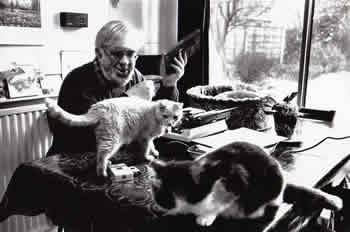Robert Westall

Best-known for his Children's and Young Adult fiction, Robert Atkinson Westall was born in 1929 in North Shields and grew up on Tyneside during the Second World War. He held a Bachelor's Degree in Fine Art from Durham University and a post-graduate degree in Sculpture from the Slade School of Art in London. After spending two years in the British Army he went on to teach Art and write for various publications, including being an art critic for the Guardian newspaper.
Westall's best known work was the Children's novel The Machine Gunners, published in 1975 and winner of the Carnegie Medal that year. He went on to win the Medal once more in 1982 for The Scarecrows. Most of his novels drew on his personal experiences as a child during The Blitz; The Machine Gunners was about a group of young children scavenging parts from downed aircraft who found an intact and functional machine gun from a crashed Heinkel He 111 bomber and developed from him telling his son Christopher stories about the things he had done as a child. The Gunners went on to be adapted for the television by The BBC in 1983 and again for Radio in 2002
Despite the target audience of children and young adults, Westall's fiction was frequently dark and borrowed themes, ideas and stories from the Horror genre and were rarely afraid of killing characters or showing off terrifying situations. The Stones Of Muncaster Cathedral won the Dracula Society's Children of the Night award in 1991. Many of his novels featured some form of Time Travel; Urn Burial and Futuretrack 5 were out-and-out Science Fiction.
Robert Westall died on the 15th April 1993 aged 63. Several manuscripts have been published posthumously and two anthologies of his short fiction were released in 1996.
- The Machine Gunners (1975)
- The Wind Eye (1976)
- The Watch House (1977)
- The Devil on the Road (1978)
- Fathom Five (1979)
- The Scarecrows (1981)
- Break of Dark (1982)
- Futuretrack Five (1983)
- The Haunting of Chas McGill (1983)
- The Cats of Seroster (1984)
- Rachel and the Angel (1986)
- The Creature in the Dark (1988)
- Ghost Abbey (1988)
- Ghosts and Journeys (1988)
- Blitzcat (1989)
- The Call and Other Stories (1989)
- Old Man on a Horse (1989)
- A Walk on the Wild Side (1989)
- Echoes of War (1989)
- Urn Burial (1989)
- If Cats Could Fly (1990)
- The Kingdom by the Sea (1990)
- The Promise (1990)
- Stormsearch (1990)
- The Stones of Muncaster Cathedral (1991)
- Yaxley's Cat (1991)
- Fearful Lovers (1992)
- Gulf (1992)
- Falling Into Glory (1993)
- A Place For Me (1993)
- Size Twelve (1993)
- The Wheatstone Pond (1993)
- A Time of Fire (1994)
- The Witness (1994)
- Blitz (1995)
- Christmas Spirit (1995)
- The Night Mare (1995)
- Blizzard (1996)
- Harvest (1996)
- Love Match (1997)
- Voices in the Wind (1997)
- David and the Kittens (2003)
- Author Appeal: See Cats Are Mean below. Westall was life-long cat lover and cats featured prominently in almost every book he wrote in a positive light.
- Cats Are Magic: Invoked most directly in The Cats of Seroster, complete with Ancient Egyptian connections, but cats in Westall's fiction are almost always magical in some way. Most often, they're able to protect unwitting humans from nasty supernatural entities or can directly aid people in destroying or driving them away.
- Cats Are Mean: Generally averted and inverted in Cats of Seroster and Urn Burial, in which the cats are victimized as creatures of witchcraft by the Villains and the canine alien race are jerkasses, respectively. When there are cats in a Robert Westall novel or short story, you can guarantee they are there to help the hero, save the hero, or be the hero.
- Corrupt Church: Played straight in several novels including; The Stones of Muncaster Cathedral, Devil On The Road and The Cats of Seroster.
- No Communities Were Harmed: Westall's work is full of this trope; The Machine Gunners is set in Garmouth as a version of the author's home town of Tynemouth and Urn Burial is set in the fictional village of Unthank near the real town of Penrith in Cumbria. So much so in The Machine Gunners that there's a Westall Walk around the area.